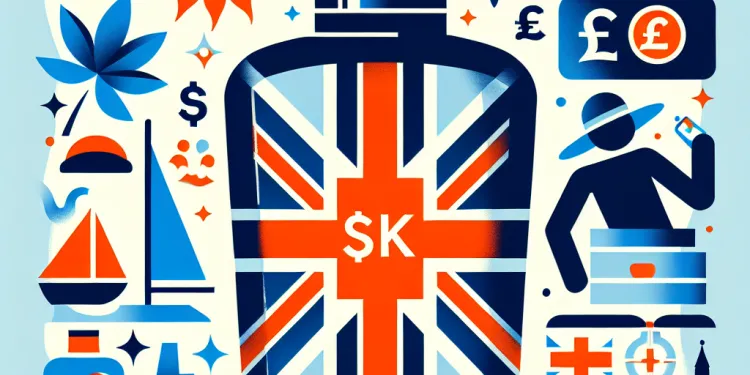
Find Help
More Items From Ergsy search
-

What SPF level is recommended to prevent sunburn?
Relevance: 100%
-
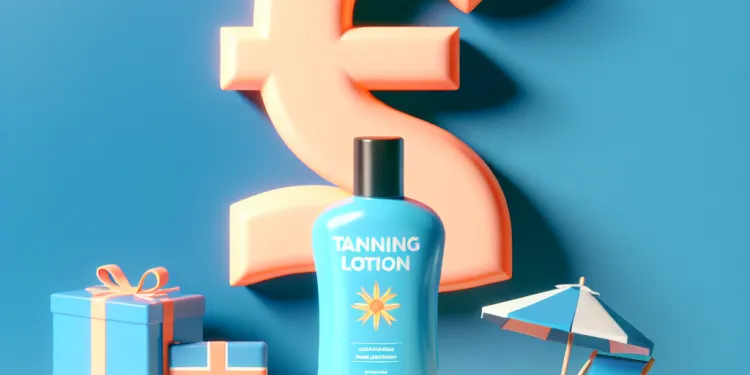
Does tanning lotion prevent sunburn?
Relevance: 70%
-
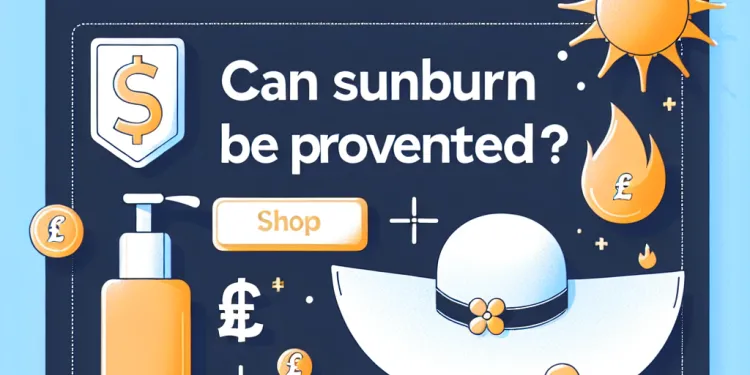
Can sunburn be prevented?
Relevance: 69%
-

What is Sunburn?
Relevance: 57%
-
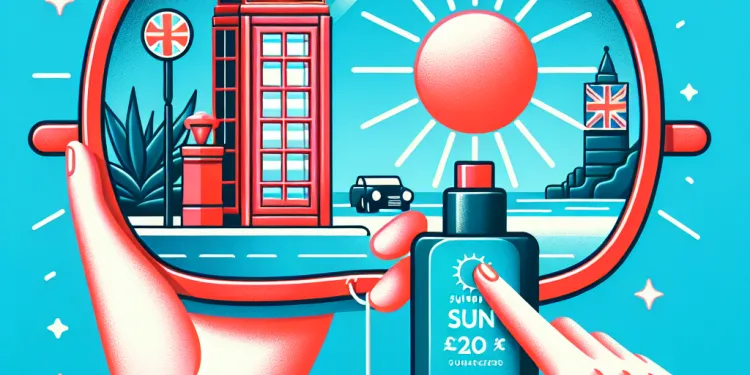
What is sunburn?
Relevance: 57%
-

What does SPF stand for?
Relevance: 53%
-
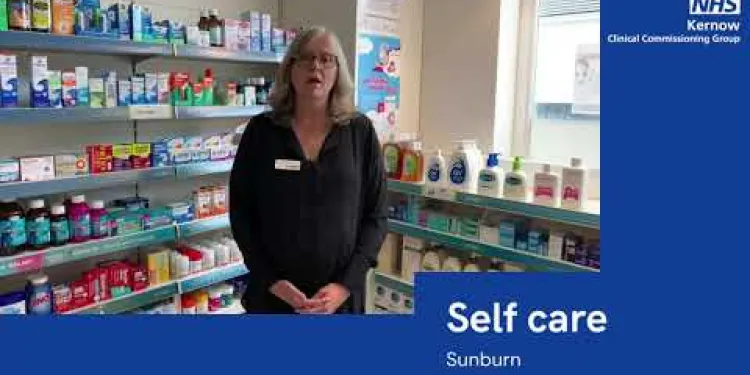
Self care - sunburn
Relevance: 52%
-
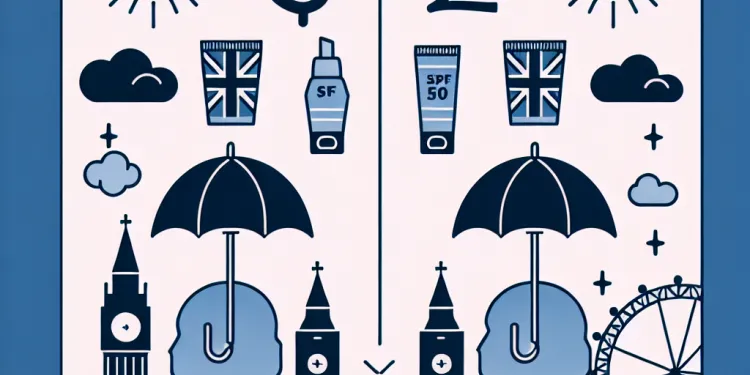
How does sunscreen with SPF 20 compare to SPF 50?
Relevance: 51%
-

Can sunburn turn into a tan?
Relevance: 51%
-

Can dark-skinned individuals get sunburned?
Relevance: 50%
-
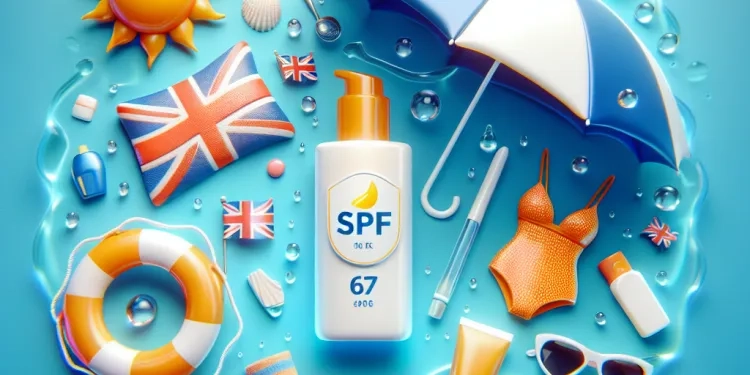
Do I need a different SPF for water-related activities?
Relevance: 49%
-
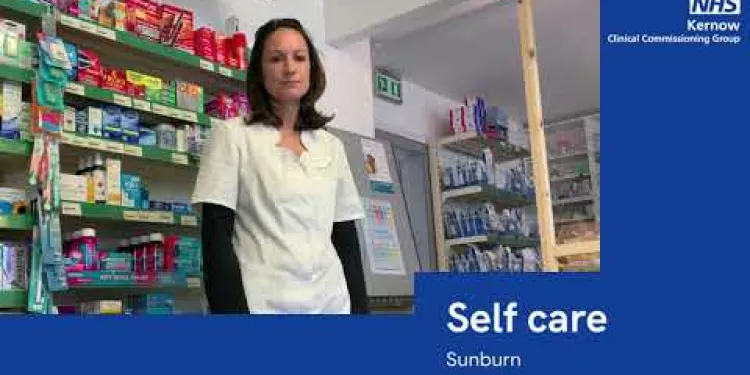
Self care - sunburn
Relevance: 49%
-

Can makeup with SPF replace sunscreen?
Relevance: 49%
-

What causes sunburn?
Relevance: 48%
-

Is a higher SPF always better?
Relevance: 48%
-

How is sunburn treated?
Relevance: 47%
-

What SPF should I use if I am going to be outdoors all day?
Relevance: 46%
-

What SPF should I use if I have sensitive skin?
Relevance: 46%
-
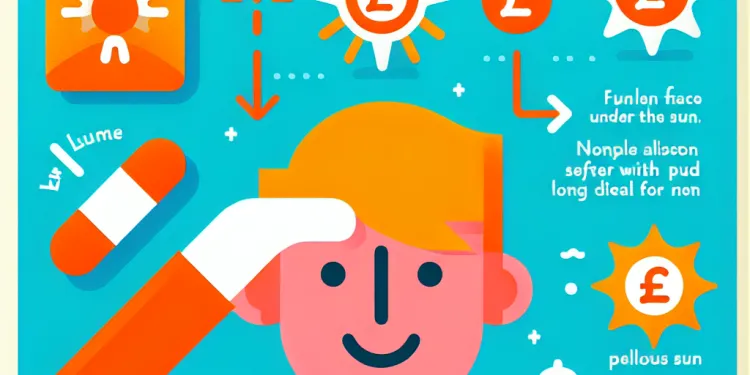
What are the long-term effects of sunburn?
Relevance: 45%
-

At what time of day is the sunburn risk highest?
Relevance: 44%
-

How long does it take for sunburn to appear?
Relevance: 43%
-

Does tanning on sunbeds reduce the risk of future sunburns?
Relevance: 43%
-
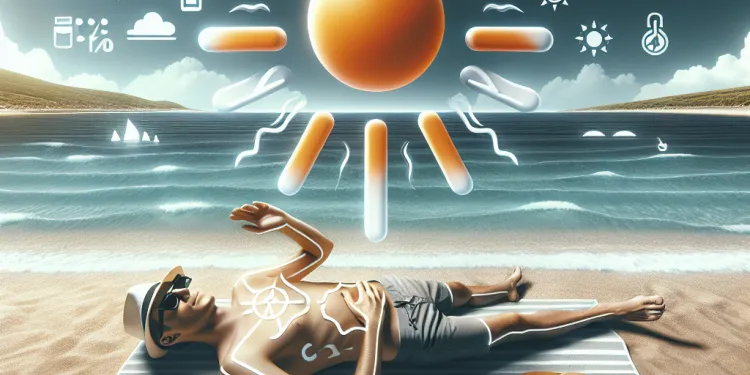
Can sunburns cause permanent damage?
Relevance: 43%
-

Is peeling a normal part of sunburn recovery?
Relevance: 43%
-

Should I use a different SPF for my face and body?
Relevance: 41%
-

Are some people more prone to sunburn?
Relevance: 41%
-

What are the symptoms of sunburn?
Relevance: 40%
-

What SPF is best for children?
Relevance: 38%
-

Is SPF 15 enough for everyday use?
Relevance: 34%
-
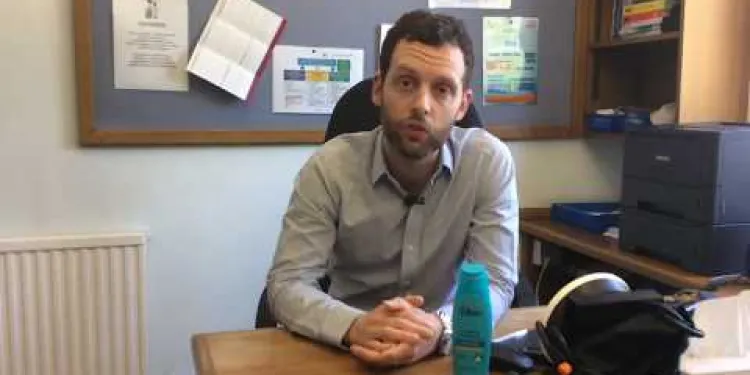
What to do if you're sunburnt
Relevance: 33%
-

Is it possible to get sunburned on cloudy days?
Relevance: 32%
-

Which factor sunscreen should I use?
Relevance: 31%
-
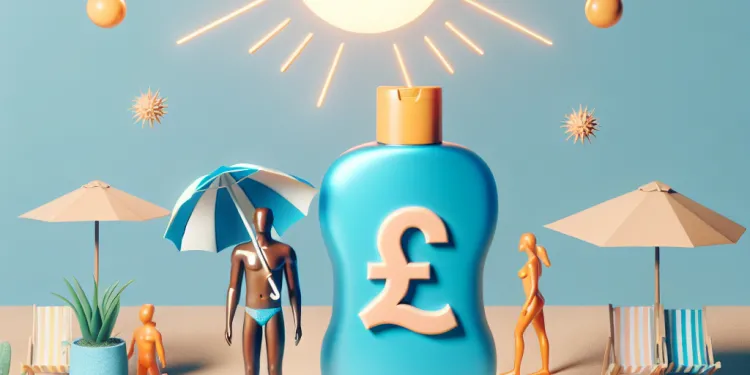
Why do some people not burn as easily as others?
Relevance: 30%
-

Does water reflect UV rays, increasing the risk of sunburn?
Relevance: 28%
-

Do I need sunscreen on cloudy days?
Relevance: 25%
-

How can I prevent heat-related illnesses?
Relevance: 25%
-

Why is reducing aldosterone levels important?
Relevance: 25%
-

Can GLP-1 levels be measured?
Relevance: 25%
-

Can diet influence cortisol levels?
Relevance: 24%
-

Can cortisol levels be measured?
Relevance: 24%
Understanding SPF Levels
Sun Protection Factor, or SPF, is a measurement that indicates how well a sunscreen can protect skin from ultraviolet B (UVB) rays, the primary cause of sunburn. In the UK, which may experience varying levels of sunlight exposure, understanding SPF is crucial to making informed decisions about sun safety.
Recommended SPF Levels
The SPF level recommended to prevent sunburn depends largely on your skin type, the intensity of sun exposure, and the duration you plan to be outside. Generally, a sunscreen with an SPF of at least 30 is recommended for most people in the UK. This level blocks approximately 97% of UVB rays, offering substantial protection against sunburn.
Higher SPF for Extended Exposure
For those planning extended periods outdoors or during peak sunshine hours, such as during a summer holiday or at the beach, an SPF of 50 or higher may be advisable. This higher level offers slightly more protection by blocking about 98% of UVB rays, providing an added safety margin for the skin.
Consideration for Skin Types
Individuals with fair skin, freckles, or a history of skin cancers may want to use higher SPF products as these skin types are more prone to damage from UV radiation. On the other hand, those with darker skin who do not burn easily might opt for a minimum of SPF 15, although SPF 30 is still generally recommended to ensure comprehensive protection.
Importance of Broad-Spectrum Sunscreen
While SPF measures protection against UVB rays, it's important to select a broad-spectrum sunscreen that also guards against UVA rays, which can lead to premature skin aging and also contribute to skin cancer risk.
Proper Application Matters
Regardless of the SPF level, proper application of sunscreen is crucial to its effectiveness. Sunscreen should be applied generously and evenly at least 15 minutes before sun exposure and should be reapplied every two hours, or more often if swimming or sweating. A typical adult should use about two tablespoons of sunscreen for full body coverage.
Conclusion
While an SPF of 30 to 50 is generally recommended to prevent sunburn for most people in the UK, individual needs may vary based on skin type and exposure risks. Always choose a product that suits your specific needs and lifestyle, ensuring it is a broad-spectrum formula for comprehensive protection.
What is SPF?
SPF stands for Sun Protection Factor. It shows how well sunscreen can protect your skin from the sun's rays that can cause sunburn. In the UK, where sunshine can change a lot, understanding SPF helps you stay safe in the sun.
What SPF Should You Use?
The right SPF for you depends on your skin, how strong the sun is, and how long you will be outside. Most people in the UK should use sunscreen with at least SPF 30. This can block about 97% of the sun's rays that cause sunburn.
Higher SPF for More Sun Time
If you are going to be outside for a long time, like on a sunny holiday or at the beach, use SPF 50 or more. This blocks about 98% of the sun's rays, giving your skin extra protection.
Different Skin Types Need Different SPF
If you have light skin, freckles, or have had skin cancer, you should use a higher SPF. If your skin is darker and you don't burn easily, you might use SPF 15, but SPF 30 is still a safe choice for full protection.
Use Broad-Spectrum Sunscreen
SPF mainly protects against sunburn, but make sure your sunscreen also protects against other sun damage. A broad-spectrum sunscreen protects against skin aging and cancer too.
How to Use Sunscreen Properly
No matter the SPF, you have to use sunscreen correctly. Put it on well and cover your skin 15 minutes before going out in the sun. Put more on every two hours, and after swimming or sweating. Use enough sunscreen – about two spoonfuls for your whole body.
Remember
SPF 30 to 50 is good for most people in the UK to stop sunburn. Choose what works for your skin and what you do outside. Always use sunscreen that protects your skin in many ways.
Frequently Asked Questions
What does SPF stand for?
SPF stands for Sun Protection Factor.
What SPF level is generally recommended to prevent sunburn?
An SPF of at least 30 is generally recommended to prevent sunburn.
Does a higher SPF offer better sun protection?
Yes, higher SPF levels offer more protection, but there are diminishing returns after SPF 50.
What is considered broad-spectrum sunscreen?
Broad-spectrum sunscreen protects against both UVA and UVB rays.
How often should sunscreen be reapplied?
Sunscreen should be reapplied every two hours, or more often if swimming or sweating.
Can SPF 30 sunscreen prevent sunburn effectively?
Yes, SPF 30 sunscreen blocks about 97% of UVB rays and is effective at preventing sunburn.
Is SPF 50 significantly better than SPF 30?
SPF 50 blocks about 98% of UVB rays, which is only slightly more than SPF 30's 97%.
Is higher SPF necessary for darker skin tones?
Darker skin tones have more natural protection but can still burn, so SPF 30 is recommended for all skin tones.
Does SPF protect against UVA rays?
SPF primarily measures UVB protection. Look for 'broad-spectrum' for UVA protection.
Is SPF 15 adequate for daily use?
SPF 15 provides some protection and is suitable for short, incidental sun exposure.
What level of SPF is recommended for outdoor sports or beach activities?
For extended outdoor activities, an SPF of 30 or higher is recommended.
Can I get a tan if I'm using SPF 30 or higher?
You can still tan with SPF 30 or higher, but your skin is better protected from UV damage.
Do all sunscreens protect against both UVB and UVA rays?
Not all sunscreens protect against both; choose a broad-spectrum sunscreen for UVA and UVB protection.
What is the difference between SPF 30 and SPF 100?
SPF 100 blocks about 99% of UVB rays, while SPF 30 blocks about 97%. The difference is marginal.
Is sunscreen necessary on cloudy days?
Yes, up to 80% of UV rays can penetrate clouds, so sunscreen is necessary on cloudy days.
Should children use a different SPF than adults?
Children should use SPF 30 or higher, similar to adults, for proper protection.
How much sunscreen should be applied to get the labeled SPF protection?
Apply at least one ounce (a shot glass full) of sunscreen to cover exposed areas adequately.
Does SPF level affect how long you can stay in the sun without burning?
Yes, the SPF number roughly indicates how much longer you can be in the sun without getting sunburned compared to not using any.
Is SPF necessary during winter or in snowy climates?
Yes, snow reflects UV rays, increasing exposure. SPF 30 or higher is recommended in snowy conditions.
Do I need sunscreen if I am using a UV-blocking clothing?
While UV-blocking clothing reduces exposure, exposed areas still need sunscreen of SPF 30 or higher.
What does SPF mean?
SPF means Sun Protection Factor.
What SPF number is good to stop sunburn?
Use sunscreen with SPF 30 or more to stop sunburn.
Does a higher SPF keep you safer from the sun?
SPF means Sun Protection Factor. It is important to keep safe in the sun.
A higher SPF number can be better. It blocks more sun rays and protects your skin more.
Use sunscreen with SPF to protect your skin. Wear a hat and stay in the shade when you can.
Ask someone for help if you don't understand SPF numbers. You can also use picture guides or videos for more help.
Yes, higher SPF numbers give you more protection from the sun, but not much more after SPF 50.
What is a broad-spectrum sunscreen?
What does "broad-spectrum" mean for sunscreen?
Broad-spectrum sunscreen protects your skin from the sun. It stops both UVA and UVB rays.
UVA rays make your skin age faster. UVB rays can burn your skin.
Use a broad-spectrum sunscreen to keep your skin safe from the sun.
Look for "Broad-Spectrum" on the sunscreen bottle.
If you want help choosing sunscreen, ask a friend or an adult.
Sunscreen that says "broad-spectrum" on the bottle keeps your skin safe from both UVA and UVB rays from the sun.
How often should you put on sunscreen again?
Put on sunscreen every 2 hours. If you swim or sweat, put it on right after. Sunscreen helps protect your skin from the sun.
Tip: Setting a timer can help you remember.
Put on more sunscreen every two hours. Put on more sunscreen after swimming or if you are sweating a lot.
Does SPF 30 sunscreen stop sunburn well?
SPF 30 sunscreen can help stop sunburn.
It is important to put on enough sunscreen.
Put sunscreen on all parts of your skin that see the sun.
Remember to use sunscreen even on cloudy days.
Reapply sunscreen every 2 hours, or after swimming or sweating.
Here are some helpful tips:
- Use a sunscreen that says "broad-spectrum" on the bottle.
- Wear a hat and sunglasses for extra protection.
- Stay in the shade when the sun is very strong.
Yes, sunscreen with SPF 30 stops about 97 out of 100 of the sun's bad UVB rays. It helps keep your skin from getting burnt.
Is SPF 50 much better than SPF 30?
When you buy sunscreen, you see numbers like SPF 30 or SPF 50.
SPF means "Sun Protection Factor." It tells you how well a sunscreen will protect your skin from the sun.
SPF 50 gives you a bit more protection than SPF 30.
But, it is very important to remember:
- Put on lots of sunscreen before going outside.
- Put it on again every two hours or after swimming.
If you need help reading text, you can try:
- Text-to-speech apps (they read text out loud).
- Reading with a friend or family member.
SPF 50 stops 98 out of 100 bad sun rays. SPF 30 stops 97 out of 100 bad sun rays. This means SPF 50 and SPF 30 are not that different.
Do people with dark skin need high SPF sunscreen?
SPF is a number on sunscreen that shows how much it protects skin from the sun.
People with dark skin might not burn as fast as people with light skin, but they can still get sun damage.
Using sunscreen with SPF 30 or higher helps protect all skin from harm.
Remember to put sunscreen on all uncovered skin, even if it seems like you don’t get burnt easily.
Ask a doctor or dermatologist for advice about your skin and sunscreen.
Using a calendar or an app might help you remember to put sunscreen on each day.
People with darker skin have some protection from the sun, but they can still get sunburned. Everyone should use sunscreen with SPF 30 to stay safe.
Does SPF stop UVA rays?
SPF tells us how well sunscreen stops sunburn. But, it does not show how well it stops UVA rays. UVA rays can hurt your skin too. You need sunscreen that says "broad-spectrum". This means it helps stop both UVA and UVB rays.
It is good to wear a hat and sunglasses too.
Use a smartphone app to remind you to put on sunscreen.
SPF tells you how much UVB protection you get. If you want protection from UVA too, look for 'broad-spectrum' on the bottle.
Is SPF 15 good for everyday use?
SPF 15 is a type of sunscreen. It helps protect your skin from the sun.
For most days, SPF 15 is okay. It helps keep your skin safe when you go outside.
If you are outside a lot or if the sun is very strong, you might need more protection. Try using SPF 30 or SPF 50 on those days.
Remember to put sunscreen on again if you are outside for a long time.
A helpful tool is setting a timer to remember when to put on more sunscreen.
SPF 15 gives a little bit of protection from the sun. It's good for when you are outside for a short time.
What SPF is good for playing sports or going to the beach outside?
When you go outside to play sports or go to the beach, it's good to use sunscreen.
Choose a sunscreen with SPF 30 or higher. SPF 30 means your skin is protected from the sun for longer.
Don't forget to put the sunscreen on all parts of your skin that the sun sees. Put it on again every few hours or after swimming.
Ask an adult for help if you need it. You can also use a timer to remind you when to put on more sunscreen.
If you are going to be outside for a long time, use sunscreen that is SPF 30 or more.
Can I still get a tan if I use sunscreen with SPF 30 or more?
Sunscreen with SPF 30 or more can protect your skin from the sun. But you can still get a tan if you stay in the sun for a long time.
If you want to go out in the sun safely, try these ideas:
- Wear a hat and sunglasses.
- Stay in the shade when you can.
- Put sunscreen on all your skin that the sun can see.
- Ask an adult you trust if you need help.
You can still get a tan when you use sunscreen with SPF 30 or more. This sunscreen helps keep your skin safe from the sun.
Do all sunscreens protect against UVB and UVA rays?
No, not all sunscreens protect against both UVB and UVA rays. UVB rays can burn your skin, and UVA rays can cause skin aging. Sunscreens that protect against both are called "broad-spectrum." Look for "broad-spectrum" on the label.
To remember:
- Check your sunscreen label for "broad-spectrum."
- Broad-spectrum means it protects against both UVB and UVA.
Using a magnifying tool can help you read labels better. Also, asking someone for help if you are unsure is a good idea.
Not all sunscreens keep you safe from everything. Pick a sunscreen that says "broad-spectrum" to protect you from UVA and UVB rays.
How is SPF 30 different from SPF 100?
SPF is a number on sunscreen bottles. It shows how well it protects your skin from the sun.
SPF 30 means your skin is kept safe 30 times longer than if you wore no sunscreen.
SPF 100 means your skin is kept safe 100 times longer than if you wore no sunscreen.
For help, try using pictures and simple words to learn about sunscreen.
SPF 100 stops 99% of UVB rays.
SPF 30 stops 97% of UVB rays.
The difference is small.
Use sunscreen tools like hats or sunglasses for extra help.
Do you need sunscreen on cloudy days?
Yes, the sun's rays can go through clouds. This means you should still use sunscreen on cloudy days. The rays can hurt your skin. You can wear a hat, long sleeves, or use sunscreen lotion to help protect your skin. It's also a good idea to stay in the shade if you can.
Should kids use a different SPF than grown-ups?
Kids have soft skin. It's different from adult skin. Because of this, they might need special sunscreen.
SPF means Sun Protection Factor. It helps keep your skin safe from the sun. Some sunscreens have a higher SPF to protect better.
Kids should use sunscreen with a high SPF. This keeps their skin safe from the sun's strong rays.
- Try to use sunscreen made just for kids. It's gentle on their skin.
- Look for water-resistant sunscreen if they play in water.
- Put sunscreen on them 15 minutes before they go outside.
- Reapply sunscreen every 2 hours, especially if they're swimming or sweating.
Adults can use kid-friendly sunscreen, too. It's safe for everyone.
Using sunscreen helps stop sunburns. Stay safe and have fun in the sun!
Kids should use sunscreen that is SPF 30 or higher. This is the same as adults should use. It helps keep their skin safe in the sun.
How much sunscreen should you use to get the right protection?
Use a full shot glass of sunscreen to cover your skin that's in the sun.
Does SPF number change how long you can be in the sun without getting sunburn?
SPF means Sun Protection Factor. It shows how strong a sun cream is. A higher SPF number means better protection. If you use a high SPF, you can stay in the sun longer without burning. But it is always good to check and be careful.
Here are some tips:
- Use sun cream with at least SPF 30.
- Wear a hat and sunglasses when outside.
- Stay in the shade when the sun is very strong, like at midday.
You can also use tools like a sunburn timer app on your phone. This can help you know how long to stay in the sun safely.
Yes, the SPF number shows how long you can stay in the sun without getting sunburned if you use sunscreen. It helps you stay in the sun longer than if you don't use any sunscreen.
Do you need sunscreen in winter or when it’s snowy?
Yes, snow bounces back the sun's rays. This can mean extra sun on your skin. Use sunscreen with SPF 30 or more when it's snowy.
Do I need sunscreen if I wear UV-blocking clothes?
If you wear special clothes that block the sun, you might still need sunscreen.
Here are some tips:
- Use sunscreen on skin not covered by clothes.
- Wear a hat and sunglasses for more protection.
- Stay in the shade when you can.
Remember: Protecting your skin from the sun is important!
UV clothes help block the sun, but you still need sunscreen on skin that shows. Use sunscreen with SPF 30 or more.
Useful Links
This website offers general information and is not a substitute for professional advice.
Always seek guidance from qualified professionals.
If you have any medical concerns or need urgent help, contact a healthcare professional or emergency services immediately.
Some of this content was generated with AI assistance. We’ve done our best to keep it accurate, helpful, and human-friendly.
- Ergsy carfully checks the information in the videos we provide here.
- Videos shown by Youtube after a video has completed, have NOT been reviewed by ERGSY.
- To view, click the arrow in centre of video.
- Most of the videos you find here will have subtitles and/or closed captions available.
- You may need to turn these on, and choose your preferred language.
- Go to the video you'd like to watch.
- If closed captions (CC) are available, settings will be visible on the bottom right of the video player.
- To turn on Captions, click settings .
- To turn off Captions, click settings again.
More Items From Ergsy search
-

What SPF level is recommended to prevent sunburn?
Relevance: 100%
-

Does tanning lotion prevent sunburn?
Relevance: 70%
-

Can sunburn be prevented?
Relevance: 69%
-

What is Sunburn?
Relevance: 57%
-

What is sunburn?
Relevance: 57%
-

What does SPF stand for?
Relevance: 53%
-

Self care - sunburn
Relevance: 52%
-

How does sunscreen with SPF 20 compare to SPF 50?
Relevance: 51%
-

Can sunburn turn into a tan?
Relevance: 51%
-

Can dark-skinned individuals get sunburned?
Relevance: 50%
-

Do I need a different SPF for water-related activities?
Relevance: 49%
-

Self care - sunburn
Relevance: 49%
-

Can makeup with SPF replace sunscreen?
Relevance: 49%
-

What causes sunburn?
Relevance: 48%
-

Is a higher SPF always better?
Relevance: 48%
-

How is sunburn treated?
Relevance: 47%
-

What SPF should I use if I am going to be outdoors all day?
Relevance: 46%
-

What SPF should I use if I have sensitive skin?
Relevance: 46%
-

What are the long-term effects of sunburn?
Relevance: 45%
-

At what time of day is the sunburn risk highest?
Relevance: 44%
-

How long does it take for sunburn to appear?
Relevance: 43%
-

Does tanning on sunbeds reduce the risk of future sunburns?
Relevance: 43%
-

Can sunburns cause permanent damage?
Relevance: 43%
-

Is peeling a normal part of sunburn recovery?
Relevance: 43%
-

Should I use a different SPF for my face and body?
Relevance: 41%
-

Are some people more prone to sunburn?
Relevance: 41%
-

What are the symptoms of sunburn?
Relevance: 40%
-

What SPF is best for children?
Relevance: 38%
-

Is SPF 15 enough for everyday use?
Relevance: 34%
-

What to do if you're sunburnt
Relevance: 33%
-

Is it possible to get sunburned on cloudy days?
Relevance: 32%
-

Which factor sunscreen should I use?
Relevance: 31%
-

Why do some people not burn as easily as others?
Relevance: 30%
-

Does water reflect UV rays, increasing the risk of sunburn?
Relevance: 28%
-

Do I need sunscreen on cloudy days?
Relevance: 25%
-

How can I prevent heat-related illnesses?
Relevance: 25%
-

Why is reducing aldosterone levels important?
Relevance: 25%
-

Can GLP-1 levels be measured?
Relevance: 25%
-

Can diet influence cortisol levels?
Relevance: 24%
-

Can cortisol levels be measured?
Relevance: 24%


